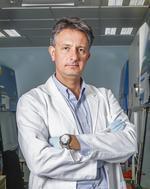Alberto Bardelli
Professor
- Department of Oncology
- SSD: BIO/17 - histology
- ORCID: orcid.org/0000-0003-1647-5070

Contacts
- 0116706323
- alberto.bardelli@unito.it
- Molecular Biotechnology Center - MBC2
Piazza Nizza 44
10126 Torino - https://www.molecularbiotechnology.unito.it/persone/alberto.bardelli
- Contacts VCard
At
- Department of Oncology
- Dipartimento di Oncologia
- Corso di Laurea Magistrale in Biotecnologie Mediche - Classe LM-9
- Laurea Magistrale in Medicina e Chirurgia - sede di Torino
- Master Program in Molecular Biotechnology
- Programma MD-PhD della Scuola di Medicina
- Scuola di Studi Superiori "Ferdinando Rossi" dell'Università degli Studi di Torino - SSST
- Molecular Medicine PhD Program
- PhD in Complex Systems for Quantitative Biomedicine
- PhD Programme in Complex Systems for Life Sciences (until 35th cycle)
Curriculum vitae
 Curriculum Vitae
(0.3 MB)
Curriculum Vitae
(0.3 MB) Courses
- ADE Impatto della Genomica sulla ricerca biomedica e sulla pratica clinica I anno (MED3467)
Laurea Magistrale in Medicina e Chirurgia - sede di Torino - C.I. ORGANIZZAZIONE, FUNZIONE E RICAMBIO CELLULARE IN TESSUTI E ORGANI UMANI (SME1023)
Corso di Laurea Magistrale in Biotecnologie Mediche - Classe LM-9 - FUNCTIONAL GENOMICS (BIO0167 Pds 309-MCTB)
Master Program in Molecular Biotechnology - Le basi genetico-molecolari delle terapie personalizzate. Responsabile prof Alberto Bardelli
Programma MD-PhD della Scuola di Medicina - Medicina genomica e computazionale in Oncologia (SME1023D)
Corso di Laurea Magistrale in Biotecnologie Mediche - Classe LM-9 - TIROCINIO di ONCOLOGIA MOLECOLARE (SME0907)
Corso di Laurea Magistrale in Biotecnologie Mediche - Classe LM-9 - The Genetic Basis of Cancer (BIO0167B Pds 309-MCTB)
Master Program in Molecular Biotechnology
Research topics
After his undergraduate studies, Bardelli moved to the Ludwig Institute for Cancer Research in London where he obtained a Ph.D. in Biochemistry and Molecular biology from the University College London (UCL).
He moved to the United States in 1999 for a post-doctoral fellowship in the laboratory directed by Bert Vogelstein at the Howard Hughes Medical Institute, Johns Hopkins University (Baltimore). Here Bardelli began studying the genomics of cancer. One of his most significant publications from that period identified for the first-time mutations in kinase genes (the kinome) that are associated with colorectal cancer.
As an independent investigator, he pioneered the combined use of genomics, patients’ avatars and liquid biopsies to accurately predict tumor's response and resistance to targeted agents.
Bardelli’s group showed that the analysis of circulating tumor DNA (liquid biopsies) allows monitoring tumor’s evolution and resistance to targeted therapies and was the first to pinpoint the emergence of KRAS/NRAS mutations in the blood of patients during EGFR blockade.
His discoveries are published in over 250 scientific articles - over 100 as an independent investigator - in international journals such as Nature, Science, Cancer Cell, Nature Medicine, JAMA and Lancet Oncology and have given rise to comprehensive international clinical studies such as PEGASUS. Since 2014 he has been in the ranking of the most cited researchers in the world "Web of Science".
Member of authoritative scientific associations such as EACS - European Academy of Cancer Sciences and EMBO - European Molecular Biology Organization, he was President of EACR - European Association for Cancer Research (2018-2020) and is a member of the Scientific Committee of the AIRC Foundation. In 2020 he was awarded the Guido Venosta Award assigned by AIRC and conferred by the Presidency of the Italian Republic for research aimed at developing new therapeutic approaches to neoplasms. Since 2022 he has been appointed as Scientific Director of IFOM ETS – The AIRC Institute of Molecular Oncology, Milan.
Activities in agenda
Academic bodies
Office hours
Previo appuntamento (e-mail)By appointment (by email)




